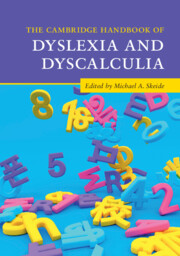Book contents
- The Cambridge Handbook of Dyslexia and Dyscalculia
- The Cambridge Handbook of Dyslexia and Dyscalculia
- Copyright page
- Contents
- Figures and Tables
- Contributors
- Acknowledgements
- General Introduction
- Part I Theoretical Frameworks and Computational Models
- Part II Cognitive Profiles and Behavioural Manifestations
- 4 Cognitive Profiles and Co-occurrence of Dyslexia and Dyscalculia
- 5 Reading and Mathematics Anxiety
- Summary: Cognitive Profiles and Behavioural Manifestations
- Part III Genetic and Environmental Influences
- Part IV Neurodevelopmental Foundations
- Part V Gender, Ethnicity, and Socioeconomic Background
- Part VI Cultural Unity and Diversity
- Part VII Early Prediction
- Part VIII Intervention and Compensation
- Part IX Best Practice – Diagnostics and Prevention
- Part X Best Practice – Schooling and Educational Policy
- General Summary
- References
- Index
- References
4 - Cognitive Profiles and Co-occurrence of Dyslexia and Dyscalculia
from Part II - Cognitive Profiles and Behavioural Manifestations
Published online by Cambridge University Press: 28 July 2022
- The Cambridge Handbook of Dyslexia and Dyscalculia
- The Cambridge Handbook of Dyslexia and Dyscalculia
- Copyright page
- Contents
- Figures and Tables
- Contributors
- Acknowledgements
- General Introduction
- Part I Theoretical Frameworks and Computational Models
- Part II Cognitive Profiles and Behavioural Manifestations
- 4 Cognitive Profiles and Co-occurrence of Dyslexia and Dyscalculia
- 5 Reading and Mathematics Anxiety
- Summary: Cognitive Profiles and Behavioural Manifestations
- Part III Genetic and Environmental Influences
- Part IV Neurodevelopmental Foundations
- Part V Gender, Ethnicity, and Socioeconomic Background
- Part VI Cultural Unity and Diversity
- Part VII Early Prediction
- Part VIII Intervention and Compensation
- Part IX Best Practice – Diagnostics and Prevention
- Part X Best Practice – Schooling and Educational Policy
- General Summary
- References
- Index
- References
Summary
This chapter covers the cognitive underpinnings of dyslexia and dyscalculia and their co-occurrence, from the perspective of the multifactorial deficit model of developmental disorders (Pennington 2006). The two disorders are first defined with respect to their typical behavioural manifestation. Next, prevalence rates of single as well as co-occurring deficits are described and critically discussed in light of methodological challenges. Subsequently, the cognitive bases of each disorder, as well as their comorbidity, are specified in the light of the multifactorial deficit model. Finally, methodological considerations regarding the link between dyslexia, dyscalculia, and other neurodevelopmental disorders are presented. Future avenues of research are also outlined, with a particular emphasis on treating reading and maths performance as a continuous variable, and on longitudinal studies. The studies presented in this chapter are mainly based on children attending primary school (age range approximately 6–12 years old). There are, of course, differences in the organization, duration, and onset of formal instruction across countries. Aside from nation-specific differences, however, this age period is particularly relevant for research on dyslexia and dyscalculia, as this is the typical time window when literacy and arithmetic skills are acquired.
- Type
- Chapter
- Information
- The Cambridge Handbook of Dyslexia and Dyscalculia , pp. 65 - 82Publisher: Cambridge University PressPrint publication year: 2022
References
Suggestions for Further Reading
- 1
- Cited by



